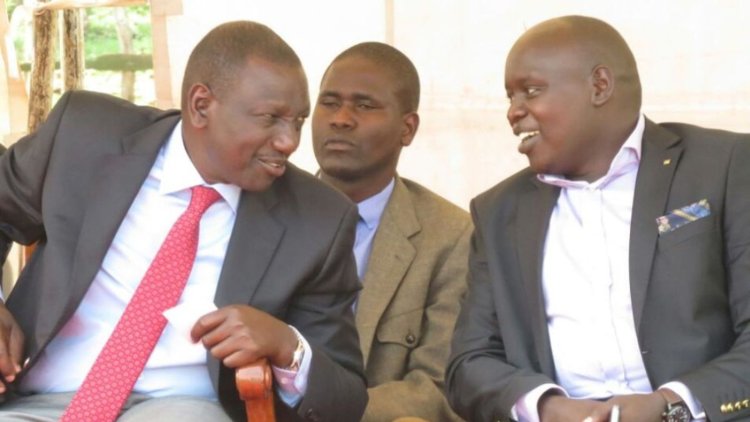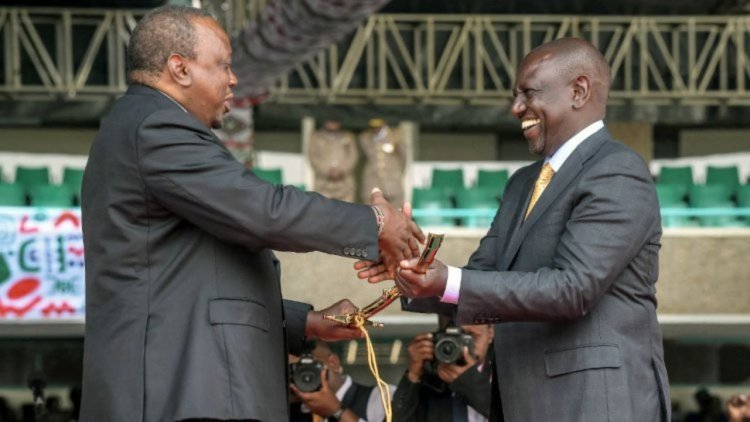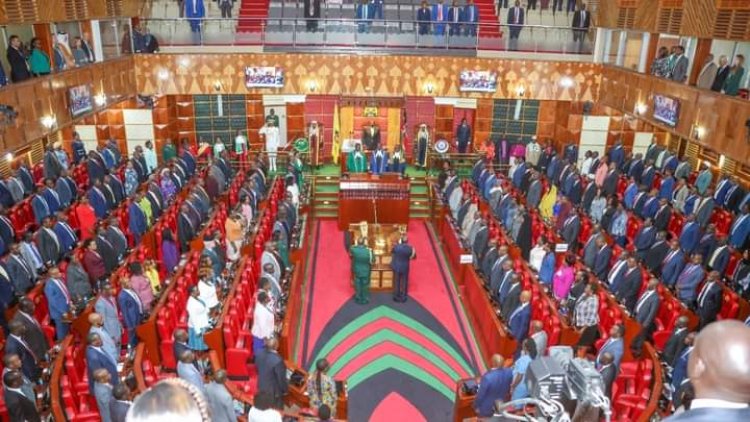Cherargei Fronts Proposal To Increase Ruto's Term Limit To 7 Years
President William Ruto's ally argued that five years might be insufficient for a president

Nandi Senator Samson Cherargei on Friday, September 22 sparked fresh calls to have the presidential term limit in Kenya increased from the current five years.
The National Dialogue Committee (NADCO) concluded receiving public memoranda with Cherargei presenting a memorandum to the 10-member dialogue committee proposing to have the Constitution of Kenya amended to have a president in office for seven years.
President William Ruto's ally argued that five years might be insufficient for a president given the workload that is bestowed upon him or her in terms of service delivery to Kenyans as promised in the election manifesto and running of the government.

Former President Uhuru Kenyatta hands over the instruments of power to Kenya's fifth President William Ruto at Kasarani Stadium. /TWITTER
If Cherargei's proposal is actualised it then means that if one is elected president he or she would be in office for 7 years with the possibility of extension by another 7-year term.
What The Constitution Says About Presidential Term Limits
Article 142 of the Kenyan 2010 Constitution indicates that: (1) The President shall hold office for a term beginning on the date on which the President was sworn in, and ending when the person next elected President in accordance with Article 136 (2) (a) is sworn in. The President, however, is prohibited from holding office for more than two five-year terms.
Though one cannot rule out the possibility of amending the term limits of a Head of State, those fronting the proposal should know that it is a difficult process to have their wishes granted. The Constitution carries complex mechanisms for amending certain fundamental provisions, and the presidential term limit happens to be one of them.
What It Takes To Change Presidential Term Limit
As per a past report by The Conversation, one of the requirements is that the proposal would have to be approved by Kenyans in a referendum. Voters are unlikely to accept any efforts to interfere with what is a robust and effectively functioning constitutional system...why is that the case?
The purpose of term limits is to minimise corruption and abuse of office, open the government to new people and ideas, and infuse the government with more innovative and creative ways to solve national problems.
Term limits reinvigorate the country’s democracy and curb the potential for monopoly. They protect the democratic system from turning into a de facto dictatorship and prevent the incumbent from becoming a president-for-life.
Term limits are especially important in a country such as Kenya where most citizens still believe that an incumbent administration will favour the president’s ethnic group. They however do not discourage poor performance and the Constitution provides for other ways to deal with gross misconduct from a Head of State, including impeachment.
The Constitution thus sets the process for amending some of its provisions. For instance, changing the term limits of a President in Kenya requires:
- Securing the votes of two-thirds of both houses of parliament – the Senate and the National Assembly
- Securing the support of a simple majority of the citizens of Kenya voting in a referendum.
Chances Of Amending Presidential Term Limit
It is also unlikely that a constitutional amendment to change the presidential term would garner the two-thirds majority in Parliament since it would also require the support of the opposition, as Kenya Kwanza does not hold a two-thirds majority in either house.
The opposition, being Azimio la Umoja, would also oppose efforts to change a presidential term out of concern that the amendment could significantly enhance the president’s ability to remain in power for more than two terms.
Second, Kenyans would probably see the amendment as a naked power grab and a danger to their constitutional order, and as a result, could punish the proposal’s supporters during future elections.
Third, the complex and prolonged process involved in amending the constitution could derail Ruto’s policy agenda and reduce his re-election prospects in 2027.


 admin
admin 




